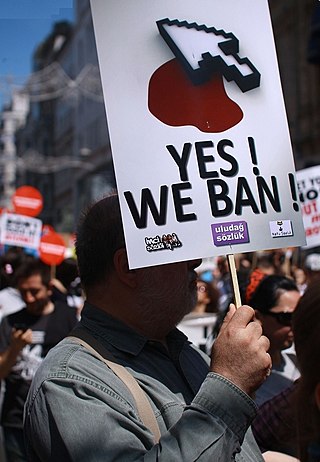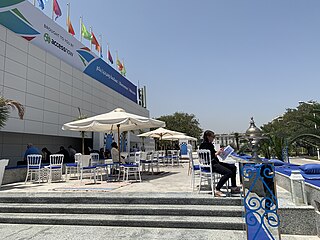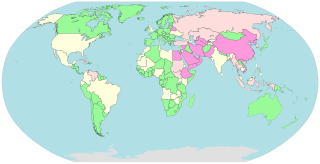Related Research Articles
Telecommunications in the Democratic Republic of the Congo include radio, television, fixed and mobile telephones, and the Internet.
Telecommunications in the Republic of the Congo include radio, television, fixed and mobile telephones, and the Internet.
In Iran, censorship was ranked among the world's most extreme in 2023. Reporters Without Borders ranked Iran 177 out of 180 countries in the World Press Freedom Index, which ranks countries from 1 to 180 based on the level of freedom of the press. Reporters Without Borders described Iran as “one of the world’s five biggest prisons for media personnel" in the 40 years since the revolution. In the Freedom House Index, Iran scored low on political rights and civil liberties and has been classified as 'not free.'

Internet censorship in India is done by both central and state governments. DNS filtering and educating service users in suggested usages is an active strategy and government policy to regulate and block access to Internet content on a large scale. Also measures for removing content at the request of content creators through court orders have become more common in recent years. Initiating a mass surveillance government project like Golden Shield Project is also an alternative discussed over the years by government bodies.

Censorship in Turkey is regulated by domestic and international legislation, the latter taking precedence over domestic law, according to Article 90 of the Constitution of Turkey.

Internet censorship is the legal control or suppression of what can be accessed, published, or viewed on the Internet. Censorship is most often applied to specific internet domains but exceptionally may extend to all Internet resources located outside the jurisdiction of the censoring state. Internet censorship may also put restrictions on what information can be made internet accessible. Organizations providing internet access – such as schools and libraries – may choose to preclude access to material that they consider undesirable, offensive, age-inappropriate or even illegal, and regard this as ethical behaviour rather than censorship. Individuals and organizations may engage in self-censorship of material they publish, for moral, religious, or business reasons, to conform to societal norms, political views, due to intimidation, or out of fear of legal or other consequences.

Iran is notable for the degree of internet censorship by its government. Iran was the second place in the world for internet censorship in 2022 after repeatedly shutting off the internet in parts of country and blocking access to social media platforms to curb protests sparking from of Mahsa Amini’s death, a new poll has showed. The country now targets Virtual Private Networks (VPNs) in order to completely cut off the people from access to outside media. Several popular social media platforms and instant messaging applications are blocked by the Iranian government and the Islamic Revolutionary Guard Corps (IRGC), including YouTube, Facebook, Twitter, WhatsApp, Telegram, Snapchat, Reddit, Medium, Instagram, and Threads. Some streaming services, including Netflix and Hulu, are also blocked by the government. Websites relating to health, science, sports, news, pornography, and shopping are also routinely blocked.

The American video-sharing platform YouTube is the second-most popular website as of August 2019, according to Alexa Internet. According to the company's press page, YouTube has more than one billion users, and each day, those users watch more than one billion hours of video. Censorship of it has occurred and continues to occur to varying degrees in most countries throughout the world.
An Internet kill switch is a countermeasure concept of activating a single shut off mechanism for all Internet traffic.
Facebook is a social networking service that has been gradually replacing traditional media channels since 2010. Facebook has limited moderation of the content posted to its site. Because the site indiscriminately displays material publicly posted by users, Facebook can, in effect, threaten oppressive governments. Facebook can simultaneously propagate fake news, hate speech, and misinformation, thereby undermining the credibility of online platforms and social media.
Censorship of Twitter refers to Internet censorship by governments that block access to Twitter. Twitter censorship also includes governmental notice and take down requests to Twitter, which Twitter enforces in accordance with its Terms of Service when a government or authority submits a valid removal request to Twitter indicating that specific content is illegal in their jurisdiction.

An Internet outage or Internet blackout or Internet shutdown is the complete or partial failure of the internet services. It can occur due to censorship, cyberattacks, disasters, police or security services actions or errors.

Access Now is a non-profit organization founded in 2009 with a mission to defend and extend the digital civil rights of people around the world. Access Now supports programs including an annual conference on Human Rights (RightsCon), an index of internet shutdowns (#KeepItOn), and providing exit nodes for Tor network.

In Russia, internet censorship is enforced on the basis of several laws and through several mechanisms. Since 2012, Russia maintains a centralized internet blacklist maintained by the Federal Service for Supervision of Communications, Information Technology and Mass Media (Roskomnadzor).

VPN blocking is a technique used to block the encrypted protocol tunneling communications methods used by virtual private network (VPN) systems. Often used by large organizations such as national governments or corporations, it can act as a tool for computer security or Internet censorship by preventing the use of VPNs to bypass network firewall systems.

David Kaye was the United Nations special rapporteur on the Promotion and Protection of the Right to Freedom of Opinion and Expression between August 2014 and July 2020. He was succeeded by Irene Khan. Kaye is clinical professor of law at the University of California, Irvine on public international law, international humanitarian law human rights and international criminal justice. He is co-director of the UCI Fair Elections and Free Speech Center working at the intersection of technology, freedom of speech and democratic deliberation. He is also the independent board chair of the Global Network Initiative.
Turkey Blocks is an independent digital research organization that monitors internet access restrictions and their relation to political incidents in Turkey. Using its network of monitoring probes, the project has uncovered and documented systematic mass-censorship of communications infrastructure, primarily social media services, during national emergencies and incidents of political significance relating to human rights, freedom of expression and public policy in the region.
NetBlocks is a watchdog organization that monitors cybersecurity and the governance of the Internet. The service was launched in 2017 to monitor Internet freedom.

This list of Internet censorship and surveillance in Asia provides information on the types and levels of Internet censorship and surveillance that is occurring in countries in Asia.

The Open Observatory of Network Interference (OONI) is a project that monitors internet censorship globally. It relies on volunteers to run software that detects blocking and reports the findings to the organization. As of June 2023, OONI has analyzed 1,468.4 million network connections in 241 countries.
References
- ↑ Deibert, Ronald (2008). Access Denied: The Practice and Policy of Global Internet Filtering . The MIT Press. ISBN 0262541963.
- ↑ "Turkey blocks access to Twitter, Whatsapp: internet monitoring group". Reuters. 2016-11-04. Retrieved 2017-05-03.
- ↑ "Internet shutdown in Turkey's Southeast". Turkey Blocks. 2016-09-11. Retrieved 2017-05-03.
- ↑ "New internet shutdown in Turkey's Southeast: 8% of country now offline amidst Diyarbakir unrest". Turkey Blocks. 2016-10-27. Retrieved 2017-05-03.
- ↑ "INTERNET MONITOR 2013: Reflections on the Digital World".